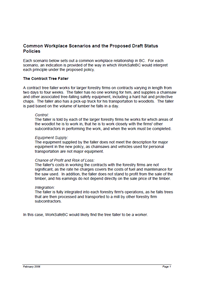Discussion Paper - Proposed Amendments to address Serious Injuries, Fatalities and the Changing Nature of Working Relationships
Workplace Status - Examples of Common Workplace Scenarios
In October 2005, the Board of Directors (BOD) hosted a symposium to seek input from stakeholders on the current and possible future state of the occupational health and safety system in B.C. As part of its health and safety initiative, the BOD also directed WCB staff to develop a forceful, rigorous and comprehensive strategy and policy amendment package to reduce serious injuries and fatalities.
Characterization of individuals at the workplace into the categories of persons with statutory duties under the Workers Compensation Act (“Act”) is an important step in applying the provisions of the Act and the Occupational Health and Safety Regulation. Many businesses in B.C. have adopted a practice of contracting out work traditionally undertaken by workers, complicating the process of characterizing an individual as a worker, an employer, a supervisor, an owner, a supplier, or a person with another status, thereby making the process of determining his or her specific responsibilities under the Act more difficult.
To address this issue, assessment policies were reviewed and proposed amendments made to clarify workplace status. Prevention policies were reviewed and proposed amendments made to clarify roles and responsibilities in the workplace and to ensure enforcement policies were fair, strong, comprehensive and effective. The proposed amendments reflect the changing nature of working relationships in BC and hold each workplace party accountable to the extent that each can influence occupational health and safety.
The BOD approved the release of the following package of policy discussion papers and draft policy items for stakeholder consultation:
- Assessment Policy Regarding Workplace Status
- Prevention Policies Regarding Roles and Responsibilities of Workplace Parties
- Prevention Policies Regarding Enforcement

